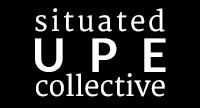“Somos Sur” is a rap and hip-hop song by Chilean-French artist Ana Tijoux. To me it insists that this world needs thinking, analysis and action from the South.
The song vibrantly also features Palestinian-British rapper Shadia Mansour and provides hip hop and rap at its best—constructively angry; ruthless in speaking back to power. But also in joining dots; rhythmically it enfolds and unfolds wider geographies of solidarity. So, in solidarity with the people of Gaza, listen to it!
Somos Sur, Hip Hop and Cape Flats
“Somos Sur” also speaks through its registers of rhythm and movement to our own academic project around situated urban political ecologies (SUPE)—and to southern urbanism; and in making use of experiences and intellectual traditions from ‘the elsewheres’ of this world in order to assemble departure points for critique and radical democratic practice.
The song links directly to what I have learnt from my meetings with Capeflatsian hip hoppers Emile YX? and Mixed Mense. Their hip hop and pedagogic work in Cape Town can certainly be described as a democratic practice in that it shifts how, and who can speak into the future of Cape Town.
Over the last couple of years I have reported on how their hip hop performs deep differences to call into being the possibility of agency and new imaginaries of democracy, in spite structural oppression. See for instance my texts on their performance at Princess Vlei, in the magazine Urban Wetlands: South Asia; and here in conversation with Emile at Stanford. Their hip hop has flowed into my critique of ‘ecosystem services’ and other technologies of de-politicisation that environmental discourse is often wrapped up in (listen to this argument in my webinar from Portland State University).
Hip hop as tool of critique and pedagogy: documentary from Cape Town
In regards of what hip hop can do, as a practice to critique and engage structural oppression, I can here mention a recent documentary film about the Cape Town hip hop scene created by US-based Kareem Alston.
The film features the many nationalities of hip hoppers in Cape Town that share their talent and devotion to hip hop as a tool of critique and pedagogy. It goes a long way to animate discussions how democratic practices can be developed from the felt sense of equality, and not from handed down ideas of simply voting every fourth or fifth year. As such of course it revives the deep democratic experiment and tradition from Cape Flats of the 1980s when United Democratic Front and other collectivities developed street-based direct democratic practices in the height of onslaught and struggle (see for instance writings by Jeremy Seekings). Another contribution from the film is that it shows how Cape Town is worlded across the continent through these hip hoppers. (30 min long.)
In solidarity: Palestinians, Mapuche and Capeflatsians
So, listen to “Somos Sur” in solidarity with Palestinians, Mapuche, and Capeflatsians. As my friend Oddveig wrote to me in fighting spirit when recommending “Somos Sur”, herself latina living in Cape Town, “doesn’t this just make you happy!”
